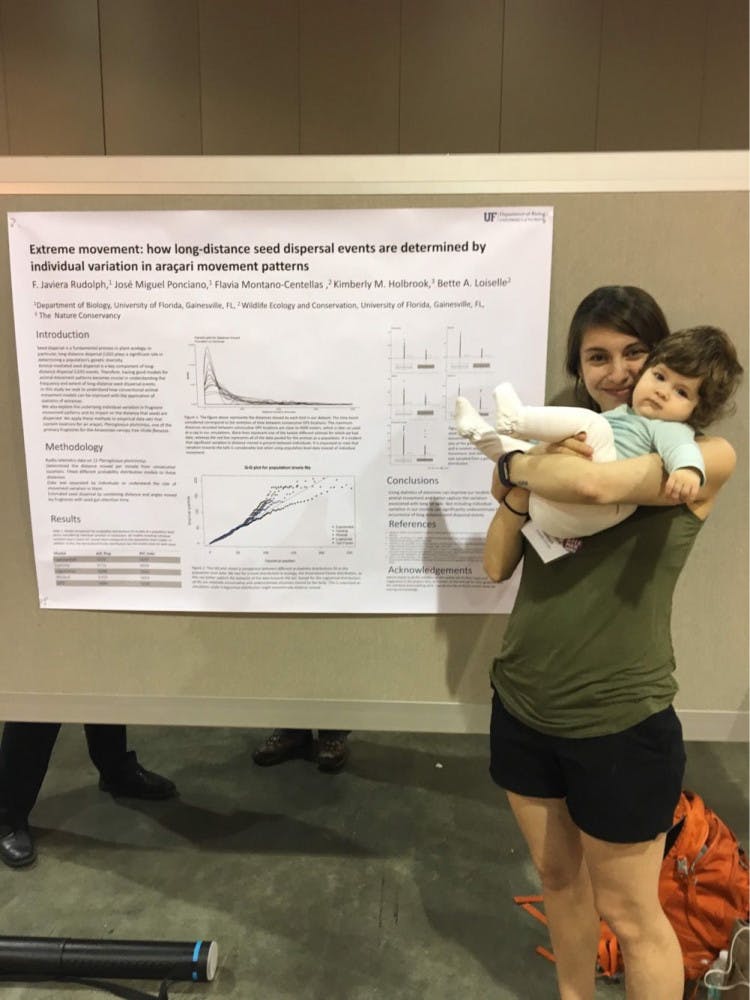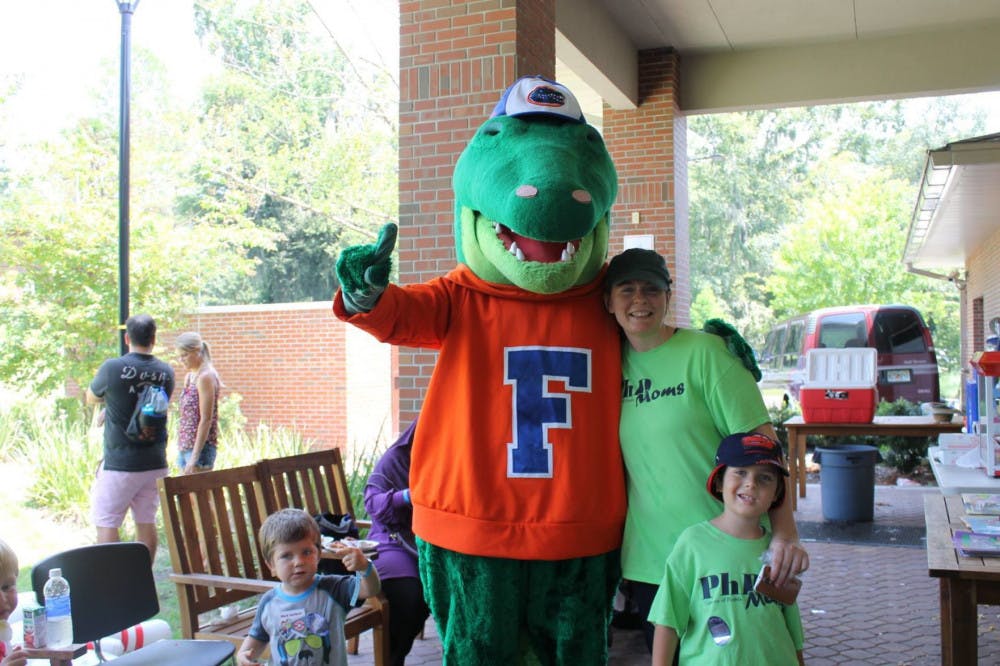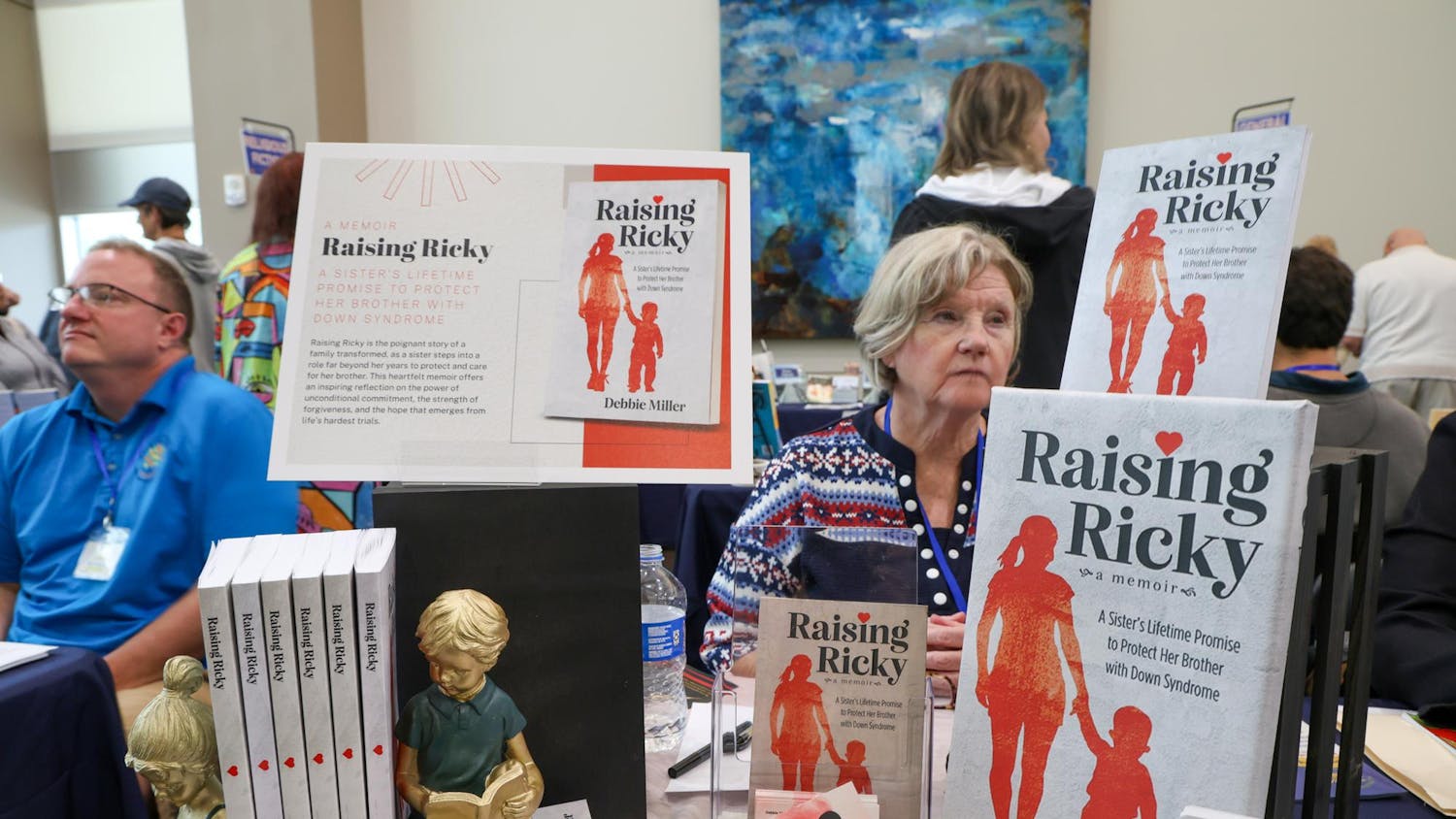Hunched over her bed, still exhausted from labor, Javiera Rudolph graded papers at 2 a.m. awaiting her newborn to wake up again at any minute.
Moments ago, she had nursed her son, Julián, born only two days before. Yet the new mother kept grading papers, flooded with anxiety, stress and adrenaline.
She had grown accustomed to her late night schedule over the last eight months, though. She worked until midnight most nights until she had no energy and crashed, only getting a few hours of sleep.
Rudolph, 27, could not afford to take the six weeks of unpaid maternity leave she was allowed because as a UF biology graduate senior she is already tight on money, she said. In Chile, her home country, mothers are given a non-negotiable six months of paid maternity leave, she said.
Student-moms at UF feel a lack of support from the university, Rudolph said. Without Gator Moms, a student-government funded organization created to support students with families, many of these women would not have a place to turn to for understanding.
Rudolph is one of 531 graduate females and 420 undergraduate females who juggle student and parental responsibilities, according to UF Office for Student Financial Affairs 2016-2017 data. Graduate students at UF currently do not receive paid maternity leave while some of UF’s peers, such as the University of Michigan and University of California Los Angeles, do offer paid leave.

Graduate senior Javiera Rudolph 27, has juggled student-mom responsibilities for the last eight months. Even though she planned her pregnancy, she said no mom will ever be as prepared as they think.
Tineka Benjamin, a 19-year-old single mom, uttered in between chuckles that it is not easy to bring her 11-month-old son to campus. Despite those who say how “perfectly fine” it should be, Benjamin said.
The UF computer science sophomore felt uncomfortable by other students’ gawking faces when her son, Princeton, toddled around and made loud noises at a student organization meeting, she said. So much so that she left early.
The loneliness she felt then is common for student-moms like herself, she said. Her one close friend is also a student-mom because non-parents cannot relate to her life.
Benjamin works 20 hours a week in the Information Technology Department and is the vice president of Gator Moms.
Support is the most important thing that student-moms need and is lacking at UF, Benjamin said, even with the club. When she first went to a Ph.D. Moms meeting, now renamed Gator Moms, she was told it may not be the right group for her as an undergraduate student.
There were no other groups for students with families, she said.
“They say they (UF) have resources, but the resources are like the butterfly museum,” she said. “Like actual help, actual resources. That’s something that I’d like to see, but it’s so far from reality.”
At 3 months old, Princeton became sick with the flu. When he recovered, the daycare Benjamin originally planned to enroll him in unexpectedly gave his spot away, she said. To take care of him, she missed a month of class and had to withdraw from the Spring semester.
She can see herself falling back into that pattern. Every time she walks into an exam unprepared, it is because she has not had time to study, she said.
“Financially, emotionally, physically, I am so tired,” Benjamin said. “I’m hanging on by a thread, hoping that I keep it together this semester.”
Katie Tanner, the UMatter, We Care associate director for student success, said a medical withdrawal is one of the most important resources for students with pregnancy-related issues. It provides tuition reimbursement and flexibility in retaking failed courses.
There is a lack of conversation on campus about ways to support non-traditional students, Tanner said.
The Care Team can help student-moms who need to communicate with professors about missing class, assignments and exams. But many students are not aware they exist to help with that, Tanner said.
“I think right now UF is really catered toward kind of typical age students, not necessarily considering there are students who have families or have children,” Tanner said.
Tanner said the university could improve resources for student-moms by offering easier access to child care and more online or night classes.
Rudolph, the current Gator Moms President, said faculty and advisers in the biology department supported her by extending exam deadlines by a year and allowed her to do teacher’s assistant work online.
Daycare is another resource that needs to be improved for student-moms on campus, Rudolph said. They would benefit from a part-time daycare on campus so that they could drop their children off before classes rather than paying for a full-time daycare.
“The reason Baby Gator started was to help out student-parents,” Rudolph said. “And it slowly transitioned into more of a business kind of thing. And they keep adding more and more professors because they can charge them more and make ends meet that way.”
Kirsten Hecht, 36, echoed Rudolph’s experience with Baby Gator. The waitlist for enrollment in the daycare could take up to a year, she said.
Baby Gator began as a student-parent co-operative program, Hecht said. But now, they pay the university to be on campus, she said.
Even with a student discount, the daycare costs $800 a month along with hundreds of dollars in annual fees and application fees, she said.

Kirsten Hecht, 36, said she brings her son (bottom right) to as many UF events as possible. The former PhD Moms President and Dmitry, 9, live in the Cory Village family housing apartments on campus.
When Hecht attended a research seminar at Ohio State University, a professor told her she would have to choose between having a family and being a researcher someday. It never dawned on the then 20-year-old that she may have to sacrifice her personal life for the career she had wanted.
“I definitely remember zoning out after because I was shocked,” she said. “I didn’t want to have to make that kind of decision. I’d never heard someone tell me that before.”
Now, Hecht is both a UF doctoral interdisciplinary ecology student and mom to 9-year-old Dmitry Kardasz. This outlook on moms in science is slowly changing, Hecht said, but “there’s still a long way to go.”
“I applaud their efforts, but I also think sometimes it’s not enough to really help,” she said. “UF has no idea how many of us there are. They don’t keep track.”
Hecht said after she got pregnant unexpectedly while completing her master’s degree, the social isolation she felt was the biggest hurdle. If Gator Moms did not exist, she said student-moms would not have any group of peers to seek support from.
“You can be a great scientist or whatever you are training for and still have a life,” she said. “Now there’s a whole generation of women who came before us opening the door for us.”
Student-moms are often more worried about their academic careers and how they will be perceived by their peers, Hecht said. Becoming a mom often makes women feel that they cannot do their jobs successfully.
“Sometimes it feels like you’re constantly being looked at like you have to prove that you can be a parent and still do this,” she said. “We just don’t exist on campus. We’re nameless and faceless.”
Contact Angela DiMichele at adimichele@alligator.org and follow her on Twitter at @angdimi
Correction: This story has been updated to reflect the correct spelling of Kirsten Hecht's last name. Her last name is Hecht, not Hechtbender.
Tineka Benjamin, 19, said she and 8-month-old Princeton enjoy watching movies together and playing outside in the park. The computer science sophomore had her son during her first year at UF.






